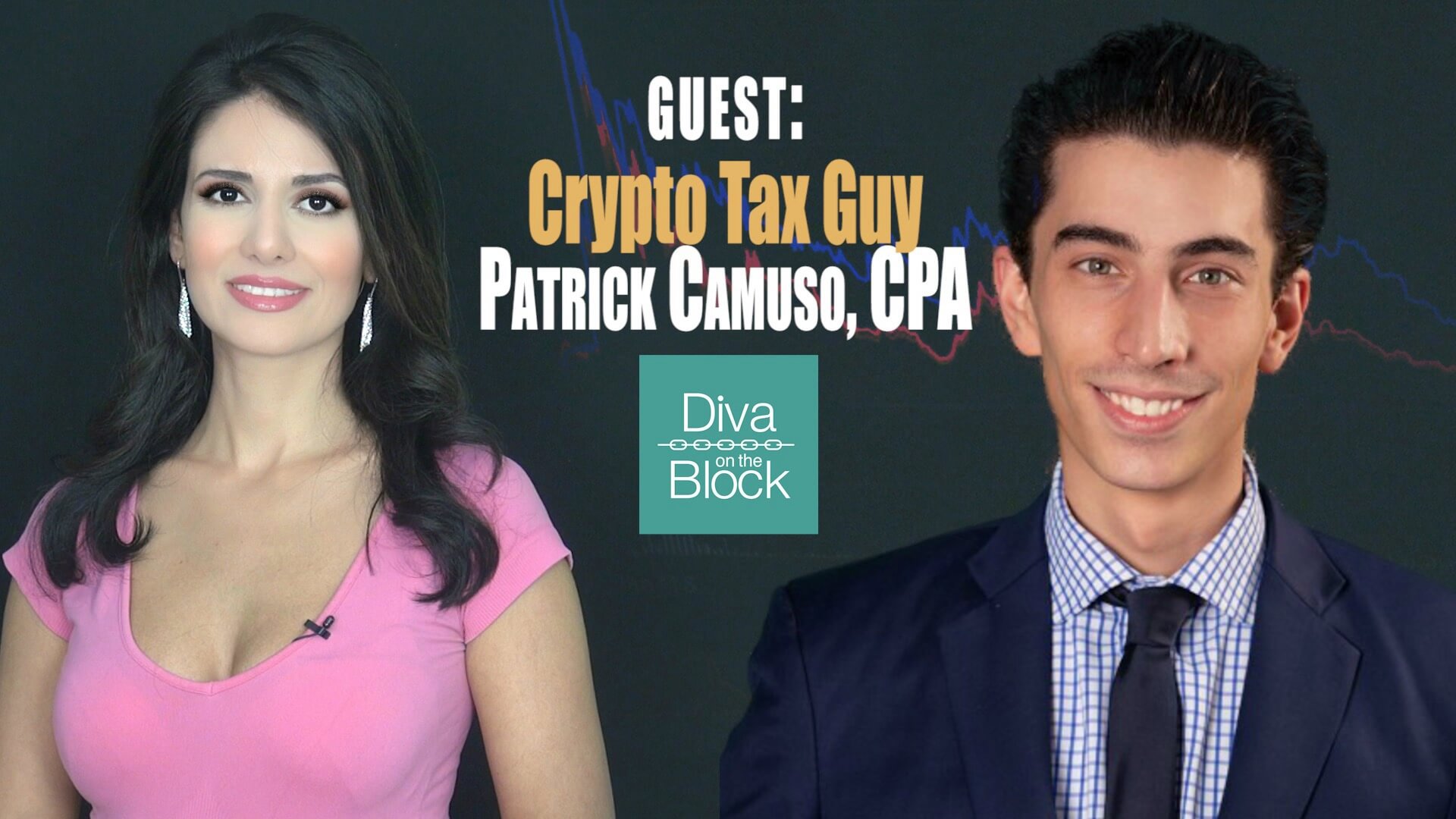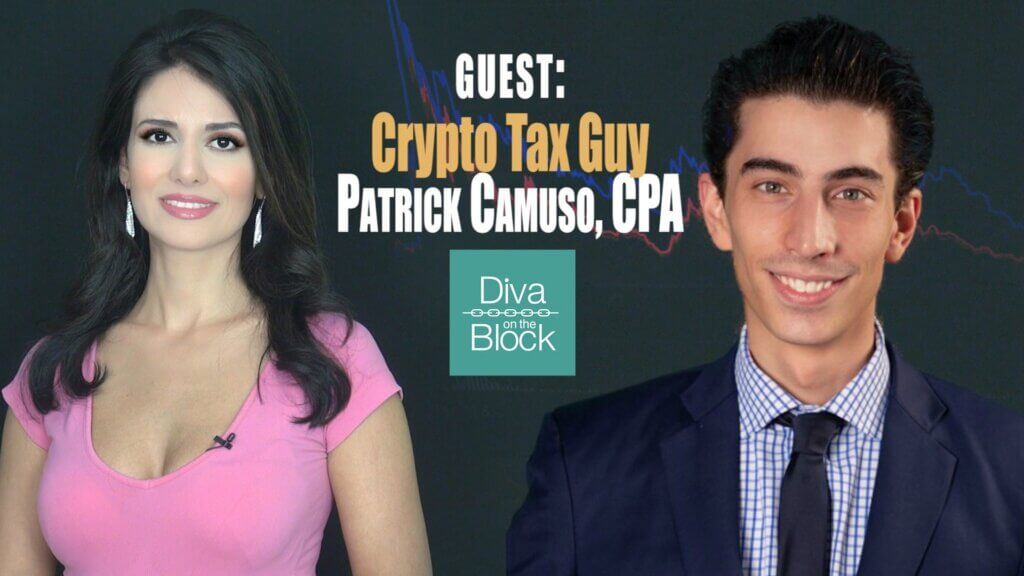Crypto Taxes Explained: As we move into the last quarter of 2019, it is a good time for traders of all types to begin thinking about their taxes. The tax code can be incredibly complicated, especially when it comes to things like tracking, reporting, and paying taxes on cryptocurrency gains.
In our recent interview, we sat down with Patrick Camuso. Patrick is a North Carolina-based CPA who has a special focus on cryptocurrency taxes and other related topics. We asked Patrick about his experience as a crypto accountant and learned more about how you can prepare for tax season.
In this episode of Invest Diva’s Diva on The Block, Kiana Danial gets the answers to these questions:
- Do cryptocurrency earnings need to be taxed?
- What are some strategies for minimizing future tax obligations?
- Ways to Prepare for Tax Season
How to Start & Grow Your Online Investing Portfolio
Do cryptocurrency earnings need to be taxed? Crypto Taxes Explained
Though Patrick recognizes there is plenty of misleading information out there telling you otherwise, cryptocurrency is, in fact, subject to federal taxes. This applies to all cryptocurrency gains, regardless of whether you are purchasing Bitcoin or anything else. Depending on your trading strategy, the rate and amount you pay can vary tremendously.
How to Generate $12,673/ month By Investing In Financial Markets (WITHOUT Being Stuck To Your Screen All Day) >>
Your trading strategy (day trading versus holding), your citizenship and country of residence, and other variables can influence the net cost of trading.
Suggested Videos:
- Unlocking John McAfee’s Life Secrets – Why He’s Doubling Down On Bitcoin Reaching $1 Million
- Overstock’s TZero CEO, Saum Noursalehi: Next Generation Capital Markets Is Here
-
Charles Hoskinson Interview – From Ethereum To Cardano And IOHK
What are some strategies for minimizing future tax obligations?
One thing that Patrick made clear is that day traders will almost always end up paying more taxes than long-term holders. This is because day trading increases the amount of “taxable events” occurring within your portfolio each year. Patrick also discussed how “wash trades” have certain rules that are unique to the crypto marketplace. In order to minimize future tax obligations, you should learn more about how crypto is taxed and—depending on your current needs—also consider hiring a crypto-oriented accountant.
Visit Patrick’s website where he has more crypto taxes explained: https://camusocpa.com/
Suggested Videos:
- Erik Finman Youngest Crypto Millionaire On Bitcoin Deficiencies
- Michael Casey – Bitcoin Solutions & Blockchain Technology
Ways to Prepare for Tax Season
Even if most of your taxes are not due until April, any accountant like Patrick will tell you the best way to have a stress-free tax season is to begin preparing as far in advance as you possibly can. Additionally, tracking your crypto trades on a monthly or at least a quarterly basis will make it easier to recognize how much you’ll need to end up paying. Taxation is, inevitably, a part of trading crypto. Taxation should not be viewed as an afterthought, rather, as an essential part of your overall trading strategy.
How to Generate $12,673/ month By Investing In Financial Markets (WITHOUT Being Stuck To Your Screen All Day) >>
Our interview with Patrick touched on all of these subjects and more. Take a listen to what Patrick had to say and let us know what you think!
Suggested Videos:
- A Story Of Resilience: Interview With Cherie Aimée
- Roger Ver Takes On Bitcoin Cash (BCH), Facebook’s Libra, & Crypto In Tokyo – Is He Satoshi Nakamoto?
- Caitlin Long Takes On Blockchain & The Challenges Of Our Financial System
🐦Follow Patrick on Twitter: https://twitter.com/PatrickCamuso
Visit his website for more crypto tax explanations: https://camusocpa.com/
This brings me back to you. Are you ready for the tax season?! After you subscribed, head over to the comment section, give me a shoutout and let me know.
Remember that as the 4th point of the IDDA technique, you must calculate your risk tolerance before deciding on the investment strategy that is suitable for your portfolio. Don’t forget to complete your risk management due-diligence before developing your investment strategy.
Suggested Videos:
- Unlocking John McAfee’s Life Secrets – Why He’s Doubling Down On Bitcoin Reaching $1 Million
- Erik Finman Youngest Crypto Millionaire On Bitcoin Deficiencies
- Michael Casey – Bitcoin Solutions & Blockchain Technology
- Overstock’s TZero CEO, Saum Noursalehi: Next Generation Capital Markets Is Here
- A Story Of Resilience: Interview With Cherie Aimée
- Roger Ver Takes On Bitcoin Cash (BCH), Facebook’s Libra, & Crypto In Tokyo – Is He Satoshi Nakamoto?
- Caitlin Long Takes On Blockchain & The Challenges Of Our Financial System
- Charles Hoskinson Interview – From Ethereum To Cardano And IOHK

